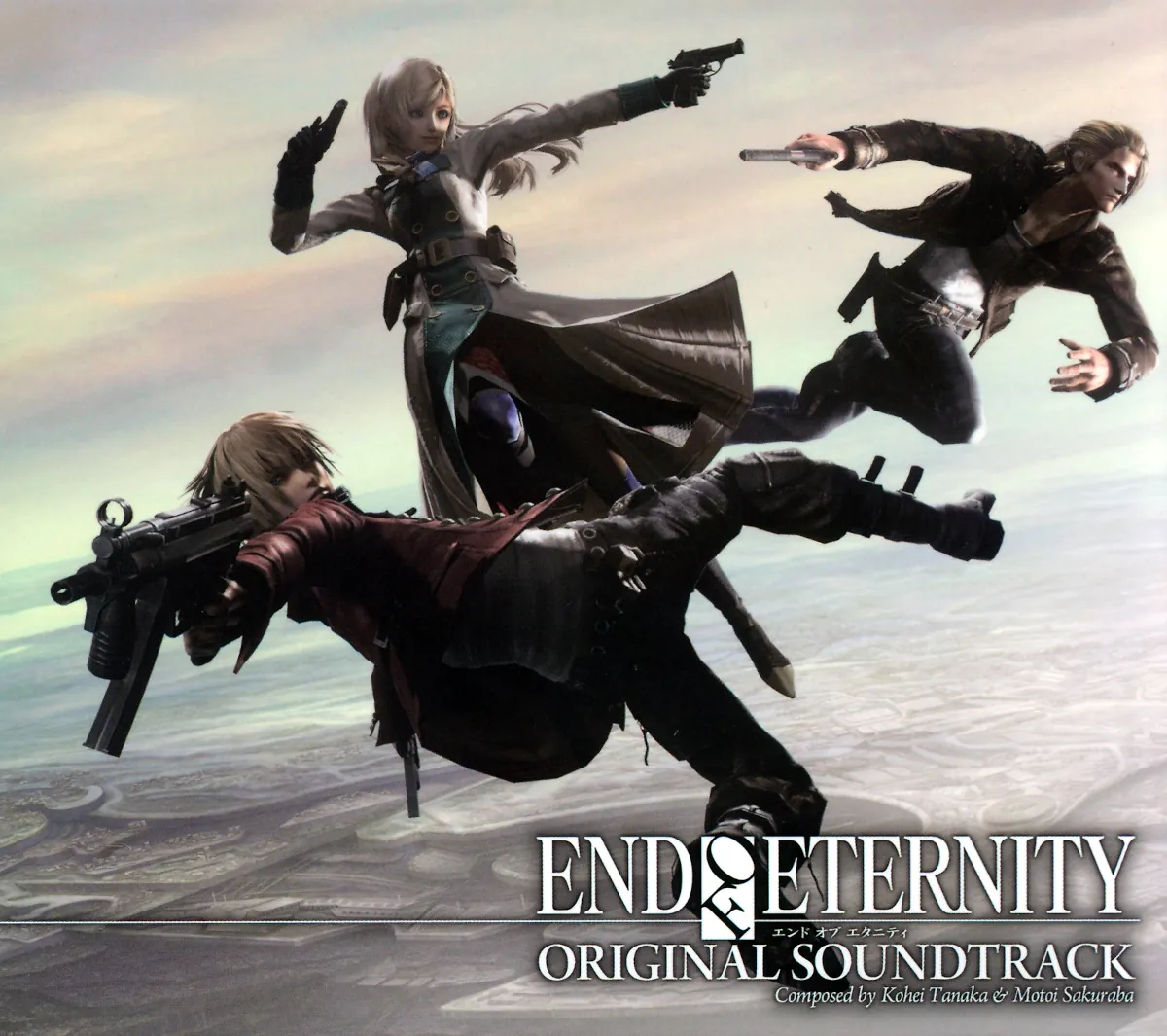End of Eternity, known as Resonance of Fate in North America, is tri-Ace’s mammoth sci-fi RPG published by Sega (as opposed to their usual publisher, Square Enix). The soundtrack to said game, by sheer quantity alone, is just as epic as the game.
118 tracks across six discs. I’ve seen more tracks across two discs in an OST. What does that tell you? It tells you that these songs have substance. Yes, some of them (particularly Sakuraba’s tracks) are getting looped once around, which doubles the length of the song. But even so, the point is that this is a substantive soundtrack, where each track is given a certain level of love and respect by the composer and producer alike. It also marks the single largest soundtrack packaged for a game in the history of the “game music” genre (the previous leader was Okami with a five disc OST).
Much of what helps elongate the album is that nearly every environment in the game has two versions of the same melodic theme. For the day/night tracks (usually Tanaka’s work), the day music will be bouncy and the night music will be softer and more enigmatic. For the A/B tracks (usually Sakuraba), the “B” side will be the same melody as A but with a harder edge, more distorted guitars, louder percussion, etc. Note that some areas actually have four songs: A and B in day and night (see, for example, “Silver Canyon” on disc three).
Anyway, let’s get past the surface discussion and talk about the split of work between Kouhei Tanaka and Motoi Sakuraba. Because it’s a pretty big deal. There’s a huge difference in style and, in my opinion, enjoyability between the two composers’ efforts.
I would liken it to the Xenosaga II soundtrack. You’ll remember that only the “cut scene” music, composed by Yuki Kajiura, was released. The in-game stuff, composed by veteran Shinji Hosoe, was never published, presumably because the music wasn’t as marketable as Kajiura’s contributions. Now, I’d actually like to have Hosoe’s work from that game released because I really enjoyed it. In contrast, if this soundtrack had been released in two volumes (the two disc “Tanaka” volume and the four disc “Sakuraba” volume), I would’ve snatched up the Tanaka volume immediately and been hesitant to go near Sakuraba. Well, not immediately, but in hindsight after hearing the full OST, that’s how I would feel about the situation.
Kouhei Tanaka is a masterful composer. He’s done his fair share of game and anime music, and it’s almost all superb. He is occasionally likened to Joe Hisaishi (see: all Miyazaki films), and I think that’s a fair comparison. The two composers have even worked together on some projects (Tengai Makyou, as an example). The point is they both have great, refined orchestral music. I loved Tanaka’s jazzy big-band and orchestral music in the Sakura Wars series, and the soundtrack to the PlayStation action RPG Alundra also remains one of my all-time favorite soundtracks. Kouhei Tanaka rarely fails to please. Here, on End of Eternity, he’s back in the saddle writing beautiful, memorable music.
Sakuraba, on the other hand, is doing bland rock band music. And by “bland,” I mean it in the sense that I’ve meant it for years now. It’s of no interest to me. Sakuraba can be a great composer (see: Star Ocean 2, Valhalla Knights Eldar Saga, among others). But he also gets into a rut with composition, and he takes on so many projects that his best work can only go to certain projects. I would not count his End of Eternity music among his best, not by a long shot. It’s merely functional, and I’m not interested in collecting VGM that’s merely functional. In that case, I’d rather just hear it in the game and be done with it.
Before anyone rips me apart for the hate, I should say that not every single track by Sakuraba is bland. Just… a lot of it. The best of his work is on disc six.
So that’s it. I’m not going to go into track details. If you find places to listen to audio samples, I’m sure you’ll be able to tell which tracks are Tanaka and which are Sakuraba. Give them a listen; maybe you’ll like everything you hear, or you’ll have the exact opposite opinion of me (that is, you’d dislike Tanaka but dig the Sakuraba tracks). In any case, this historic soundtrack (due to its size) has some great music on it. But you have to go searching for it because there’s just so much darned Sakuraba filler!




